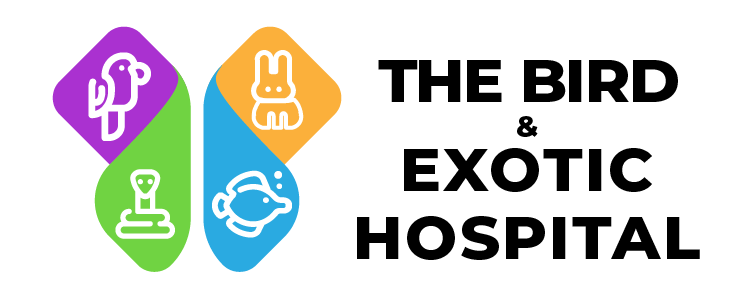Ensure Your Exotic Pet Receives Timely Emergency and Urgent Care
Ensure Your Exotic Pet Receives Timely Emergency and Urgent Care

Exotic pets, from the vibrant chatter of parrots to the captivating scales of snakes, hold a special place in our hearts. Their unique personalities and beauty enrich our lives in countless ways. However, when a sudden illness or injury strikes, navigating the specific needs of these animals can be a source of worry.
When to Seek Emergency Care for Your Exotic Pet
Knowing your exotic pet’s normal behavior and physical condition is crucial. This allows you to quickly identify any changes that might signal a potential health crisis. Here are some key situations that require immediate veterinary attention:
- Difficulty Breathing: This can manifest as rapid, shallow breaths, open-mouthed breathing, or noisy breathing. In some cases, your pet might exhibit labored breathing with their body straining. Any difficulty breathing is a serious emergency and requires immediate veterinary attention.
- Severe Bleeding: Excessive bleeding, regardless of the source, necessitates an immediate trip to the veterinarian. Direct pressure can be applied to the wound with a clean cloth or gauze pad to minimize blood loss while on the way to the vet.
- Seizures or Tremors: Seizures are uncontrolled muscle movements that can range from mild twitching to violent convulsions. Tremors are uncontrollable shaking that can be localized or affect the entire body. Both seizures and tremors can be signs of a serious underlying condition and require immediate veterinary care.
- Sudden Loss of Consciousness: If your pet loses consciousness or appears to be fainting, it’s a critical emergency. This could indicate a number of serious health issues, including stroke, heart attack, or poisoning. Seek immediate veterinary attention.
- Persistent Vomiting or Diarrhea: While occasional vomiting or diarrhea can happen for various reasons, persistent occurrences are cause for concern. Especially if accompanied by other symptoms like lethargy or loss of appetite, it could be a sign of a more serious issue and requires a veterinary visit.
- Protruding Eyes or Difficulty Opening Eyes: This could indicate a painful eye condition, infection, or trauma. If your pet is squinting excessively, rubbing its eyes, or has any visible discharge, a prompt veterinary visit is crucial.
Emergency Care vs. Urgent Care
Understanding the difference between emergency and urgent care situations allows you to make informed decisions about your pet’s healthcare needs. While emergencies necessitate immediate veterinary attention, urgent care situations require prompt medical attention but are not life-threatening. Here are some examples of situations that might require urgent care:
- Minor Wounds or Lacerations: Small cuts, scrapes, or scratches might not be life-threatening but still require veterinary attention to prevent infection and promote proper healing.
- Mild Respiratory Issues: Occasional sneezing, coughing, or mild congestion can be signs of a minor respiratory infection. However, if these symptoms persist for more than a day or two, worsen, or are accompanied by other symptoms like lethargy or loss of appetite, urgent care is recommended.
- Loss of Appetite (Short-Term): A short-term loss of appetite, especially if your pet has eaten recently, might not be a cause for immediate concern. However, if your pet refuses food for more than 24 hours, it’s important to seek urgent veterinary care.
- Mild Lethargy: While some pets naturally have lower energy levels, a sudden decrease in activity can be a sign of an underlying health issue. If your pet appears lethargic and disinterested in usual activities for an extended period, seeking urgent care is advisable.
- Mild Diarrhea or Vomiting (Isolated Incident): A single episode of diarrhea or vomiting might not be a major cause for concern. However, if it persists, worsens, or is accompanied by other symptoms like lethargy or loss of appetite, seeking urgent veterinary care is recommended.
Your Greenacres Exotic Pet’s Healthcare Partner
At The Bird and Exotic Hospital, we understand the deep bond you share with your exotic pet. As a leading provider of veterinary care for exotic animals in Greenacres, Wellington, Lake Worth, Lantana, West Palm Beach and surrounding areas, we are dedicated to offering exceptional emergency, urgent, and wellness services for your cherished companions.
Familiarizing yourself with the signs of illness and knowing your local resources for veterinary care are crucial steps in ensuring your exotic pet’s well-being. We encourage residents to be proactive and establish a relationship with our experienced team of exotic animal veterinarians. This ensures you have trusted partners by your side, ready to provide the best possible medical care for your feathered, scaled, or furry friend, no matter the situation.
Schedule an appointment for your exotic pet’s wellness exam or consultation today at The Bird and Exotic Hospital. We are committed to helping your exotic pet live a long, healthy, and happy life.
Exotic pets, from the vibrant chatter of parrots to the captivating scales of snakes, hold a special place in our hearts. Their unique personalities and beauty enrich our lives in countless ways. However, when a sudden illness or injury strikes, navigating the specific needs of these animals can be a source of worry.
When to Seek Emergency Care for Your Exotic Pet
Knowing your exotic pet’s normal behavior and physical condition is crucial. This allows you to quickly identify any changes that might signal a potential health crisis. Here are some key situations that require immediate veterinary attention:
- Difficulty Breathing: This can manifest as rapid, shallow breaths, open-mouthed breathing, or noisy breathing. In some cases, your pet might exhibit labored breathing with their body straining. Any difficulty breathing is a serious emergency and requires immediate veterinary attention.
- Severe Bleeding: Excessive bleeding, regardless of the source, necessitates an immediate trip to the veterinarian. Direct pressure can be applied to the wound with a clean cloth or gauze pad to minimize blood loss while on the way to the vet.
- Seizures or Tremors: Seizures are uncontrolled muscle movements that can range from mild twitching to violent convulsions. Tremors are uncontrollable shaking that can be localized or affect the entire body. Both seizures and tremors can be signs of a serious underlying condition and require immediate veterinary care.
- Sudden Loss of Consciousness: If your pet loses consciousness or appears to be fainting, it’s a critical emergency. This could indicate a number of serious health issues, including stroke, heart attack, or poisoning. Seek immediate veterinary attention.
- Persistent Vomiting or Diarrhea: While occasional vomiting or diarrhea can happen for various reasons, persistent occurrences are cause for concern. Especially if accompanied by other symptoms like lethargy or loss of appetite, it could be a sign of a more serious issue and requires a veterinary visit.
- Protruding Eyes or Difficulty Opening Eyes: This could indicate a painful eye condition, infection, or trauma. If your pet is squinting excessively, rubbing its eyes, or has any visible discharge, a prompt veterinary visit is crucial.
Emergency Care vs. Urgent Care
Understanding the difference between emergency and urgent care situations allows you to make informed decisions about your pet’s healthcare needs. While emergencies necessitate immediate veterinary attention, urgent care situations require prompt medical attention but are not life-threatening. Here are some examples of situations that might require urgent care:
- Minor Wounds or Lacerations: Small cuts, scrapes, or scratches might not be life-threatening but still require veterinary attention to prevent infection and promote proper healing.
- Mild Respiratory Issues: Occasional sneezing, coughing, or mild congestion can be signs of a minor respiratory infection. However, if these symptoms persist for more than a day or two, worsen, or are accompanied by other symptoms like lethargy or loss of appetite, urgent care is recommended.
- Loss of Appetite (Short-Term): A short-term loss of appetite, especially if your pet has eaten recently, might not be a cause for immediate concern. However, if your pet refuses food for more than 24 hours, it’s important to seek urgent veterinary care.
- Mild Lethargy: While some pets naturally have lower energy levels, a sudden decrease in activity can be a sign of an underlying health issue. If your pet appears lethargic and disinterested in usual activities for an extended period, seeking urgent care is advisable.
- Mild Diarrhea or Vomiting (Isolated Incident): A single episode of diarrhea or vomiting might not be a major cause for concern. However, if it persists, worsens, or is accompanied by other symptoms like lethargy or loss of appetite, seeking urgent veterinary care is recommended.
Your Greenacres Exotic Pet’s Healthcare Partner
At The Bird and Exotic Hospital, we understand the deep bond you share with your exotic pet. As a leading provider of veterinary care for exotic animals in Greenacres, Wellington, Lake Worth, Lantana, West Palm Beach and surrounding areas, we are dedicated to offering exceptional emergency, urgent, and wellness services for your cherished companions.
Familiarizing yourself with the signs of illness and knowing your local resources for veterinary care are crucial steps in ensuring your exotic pet’s well-being. We encourage residents to be proactive and establish a relationship with our experienced team of exotic animal veterinarians. This ensures you have trusted partners by your side, ready to provide the best possible medical care for your feathered, scaled, or furry friend, no matter the situation.
Schedule an appointment for your exotic pet’s wellness exam or consultation today at The Bird and Exotic Hospital. We are committed to helping your exotic pet live a long, healthy, and happy life.











